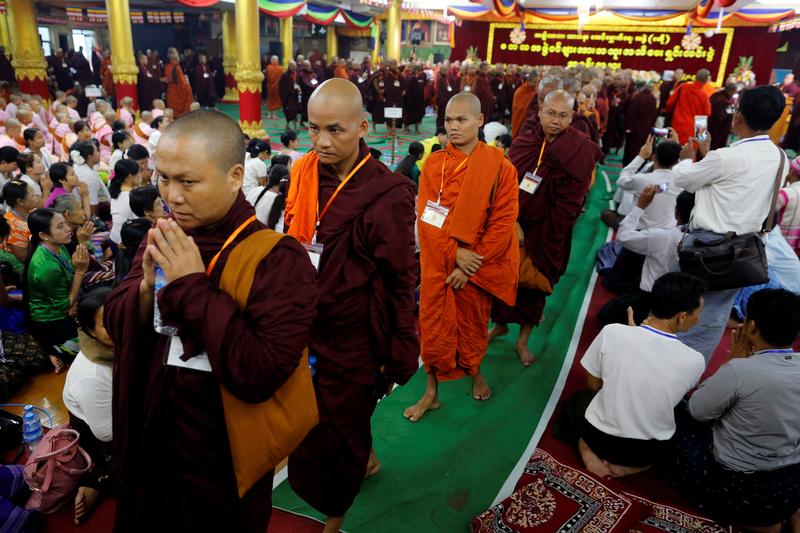Advocates of interfaith harmony say a renaming of the hardline Buddhist nationalist group Ma Ba Tha and plans to formally inject its ideology into Burma’s political sphere will do little to staunch — and may even exacerbate — the underlying religious intolerance that the organisation has been accused of fomenting.
During a conference on the weekend at a monastery in Rangoon, leaders from Ma Ba Tha, also known as the Association for the Protection of Race and Religion, announced a name change for their organisation, which will now identify as the Buddha Dhamma Parahita Foundation.
Lay supporters of Ma Ba Tha also have plans to found a political party tentatively named “135 United Patriots Party,” with the aim of contesting future elections.
Amid these dual developments, the newly christened Buddha Dhamma Parahita Foundation attempted to draw a line between its members and the newly announced political party.
“The formation of a political party, steered by Maung Thway Chon and Soe Htun Shein, is not associated with the Buddha Dhamma Parahita Foundation, which was formerly titled ‘Ma Ba Tha’ or Wuntharnu Rakhita Association. It will merely be formed by nationalist laypersons,” the foundation said in a press release on Tuesday.
But these announcements have prompted concern from some quarters, given Ma Ba Tha’s reputation for anti-Islamic rhetoric and intimidation of Burma’s Muslim minority. Many fear the metamorphosis and apparent diffusion of the organisation formerly known as Ma Ba Tha may exacerbate religious extremism, hate speech and violence directed toward Burma’s non-Buddhist populations.
“The fundamental problem of the Ma Ba Tha will not be altered by a name change, or even the decision to form a political party. This is a group that stands against the diversity of Burma, starting first and foremost with religion,” said Phil Robertson, Human Rights Watch’s Asia specialist.
Sounding a cautionary note, Robertson added, “What’s most frightening is that the Ma Ba Tha may dupe people into believing they are not the same extremists as even when they go into politics — taking a sort of Trojan horse approach to get enough votes to get in a governing coalition in a future government.”
Rangoon-based policy advocate Khin Zaw Win from the Tampadipa Institute said although the constitution and electoral laws bar anyone from a religious order from entering politics, the National League for Democracy needed to send a clearer message that its government would not tolerate clergy members influencing legislation.
Kyaw Min, a self-identifying Rohingya Muslim and chair of the Democracy and Human Rights Party — a political party that he says is not a racial or religious party, but does include Rohingya and other Muslims among its membership — believes the establishment of the 135 United Patriots Party will have repercussions for all religious minorities.
Kyaw Min said if this Ma Ba Tha-affiliated group is allowed to take part in politics, “Myanmar will face a lot of trouble and the military will not be able to control the impacts of their extremist movement — physical, social and cultural impacts.” He continued, “At present, Muslims are at ground-zero but for Christians, say if they want to build a new church, Ma Ba Tha will likely not allow it.”
The Buddha Dhamma Parahita Foundation also claimed in its statement that the group would continue its activities in accordance with the teachings of the Buddha, and that the organisation “is a philanthropic foundation that covers monks and laypersons all over the country.” Yet when DVB contacted a spokesperson for the organisation on Friday to find out whether membership eligibility would extend to non-Buddhists, the spokesperson declined to take the call.
Communal tensions
On 23 May, Burma’s highest-ranking Buddhist authority, the State Sangha Maha Nayaka Committee, ordered Ma Ba Tha to disband, but Khin Zaw Win said nonetheless “Aung San Suu Kyi should nip it in the bud” and publicly condemn nationalist behaviour that sparks religious violence.
In late April, two Muslim schools in Rangoon were forced to close after a mob of nationalists including some monks protested against the schools’ alleged lack of permission to teach religious studies and host Friday prayers. Robertson said the closures were “a sign of failure” at the local, Rangoon Division and Union levels of government to grapple with the latest incidence of inter-religious strife.
“Instead of standing up to extremists, they caved in and crushed the Muslim community’s hopes that they could be treated fairly,” he told DVB in an email on Thursday.
The London-based Burma Human Rights Network’s executive director, Kyaw Win, also condemned the attempt by elements from the group formerly known as Ma Ba Tha to transform into a political party. He added, “While Ma Ba Tha’s popularity seems very limited, it is a genuine concern that they may use propaganda and fear-mongering to gain popular support. While it feels unlikely they can succeed this way, it is worrying that it is possible.
“The ultra-nationalists will push every limit as far as they can until the authorities act. We are asking that there is intervention before violence breaks out and that the law is administered equitably.”
While the government did arrest some of those involved in an altercation last month, when monks and laypersons in Rangoon led locals to confront a family accused of harbouring undocumented Rohingya, Kyaw Win noted that authorities only stepped in after ultra-nationalists turned violent.
“We absolutely believe the attacks against Muslims in Yangon [Rangoon] will continue unless the government stands up to the ultra-nationalists and insists on the protection and freedom of all people living in Myanmar,” Kyaw Win said.



